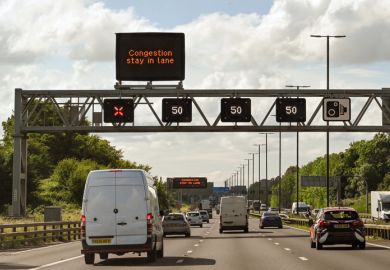Imposing student number controls (SNCs) on providers, subjects or courses in England will likely be seen as a mark of poor quality and could have a significant knock-on impact, universities have warned.
Calling plans being considered by the Westminster government to reimpose caps a “flawed and backward move”, Universities UK has highlighted the potential “adverse impacts” such a policy could have on students.
Ministers see SNCs as a way of incentivising high-quality provision, and one of the options under consideration involves setting limits on a granular basis, where caps will be imposed on particular institutions, subjects or courses, potentially based on factors such as graduate earnings, course completion rates or employment prospects.
In its response to the consultation on the policy, Universities UK – which represents 140 institutions – says this could damage student confidence and the reputation of the sector internationally.
Employers and students would be likely to view SNCs as “a signal of poor quality or poor outcomes”, it says, adding: “This would create perceptions that some graduates are more worthy than others in their contribution and undermine the wide range of transferable skills students gain through higher education.”
SNCs could also have “detrimental reputational impacts” for past and current students at that provider or those who have studied that subject or course, the body warns, adding: “Future students would become increasingly hesitant about exercising their choices.”
The government has stressed no decisions have been made and is consulting on several possible options, including returning to the sector-wide approach of capping overall student numbers seen before 2015.
It is considering the reform, alongside introducing minimum entry requirements for student loans, as part of its response to the much-delayed Augar review.
Universities UK says both SNCs and minimum entry requirements will hurt those from disadvantaged backgrounds the most.
Its consultation response stresses that SNCs would “entrench disadvantage” because students who are unable to move location to attend university will have fewer opportunities to apply, meaning they will likely choose an alternative path with worse employment options.
The body has also claimed that restricting student numbers could damage government priorities including “upskilling” the population and “levelling up” hard-hit areas as university finances would be hit, restricting their ability to invest locally.
The president of Universities UK, Steve West, said universities would oppose SNCs in the “strongest possible terms”, adding: “We agree with government that geography should not limit opportunity and avoiding student number caps is essential if we are to succeed in creating more opportunities to upskill for everyone, regardless of their background.”
The National Union of Students has also objected to the proposals in its consultation response, calling minimum entry requirements an “attack on opportunity”.
President Larissa Kennedy said such a change would “cruelly target those from marginalised communities and seek to gatekeep education”.
Register to continue
Why register?
- Registration is free and only takes a moment
- Once registered, you can read 3 articles a month
- Sign up for our newsletter
Subscribe
Or subscribe for unlimited access to:
- Unlimited access to news, views, insights & reviews
- Digital editions
- Digital access to THE’s university and college rankings analysis
Already registered or a current subscriber?








